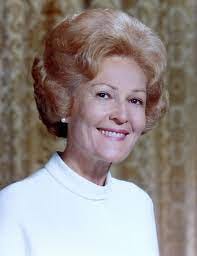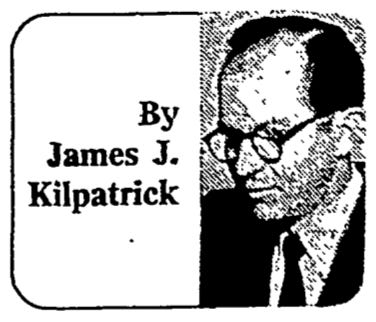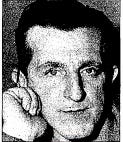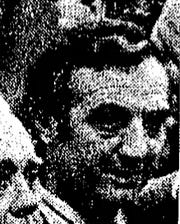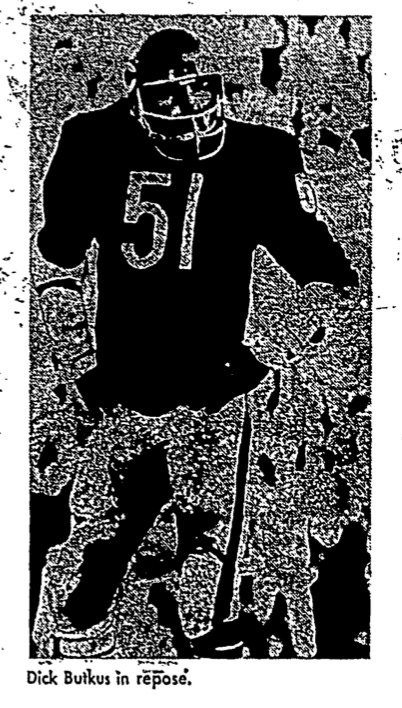To access all site contents, click HERE.
Why do we run this separate item, Mike Royko 50 Years Ago Today? Because Steve Bertolucci, the hero of the serialized novel central to this Substack, “Roseland, Chicago: 1972,” lived in a Daily News household. The Bertoluccis subscribed to the Daily News, and back then everybody read the paper, even kids. And if you read the Daily News, you read Mike Royko. Get your Royko fix on Twitter too: @RoselandChi1972.
September 18, 1972
As we head into this column, recall that in our 1972 timeline, the Vietnam War is still very much on. But President Nixon has been withdrawing troops, promising peace, and even announced the imminent end of the draft.
Young men aren’t so worried about getting plucked out of American life and sent to fight. The war has shifted to massive bombing of North Vietnam. People talk about the bombing; whether people like Jane Fonda should be spouting off about the bombing; and whether Nixon is talking peace as a political ploy because the 1972 presidential election is fast approaching.
That’s the Vietnam debate at this point in 1972, and it is just that, a debate—there are no big anti-war street and campus protests going on anymore.
What about Mike? Mike is not pro-Vietnam War, though in his Mike way, he doesn’t just say so.
Instead, you usually have to read one of his Vietnam columns all the way through and think about it before you realize who he’s skewering, as in the 1966 column “Patriotic Pat Swings Again”. We covered it in the Weekend Edition for Feb. 12-13, 1972. You can read the whole column in the Royko column compilation book “Up Against It.” At the height of the war, Pat Boone recorded a popular song—"Wish You Were Here, Buddy”—in which he took on the persona of a soldier fighting in Vietnam, and threatened to come home and kick his friend’s ass for not serving.
Mike investigated and found that Pat Boone could have served in Korea, but got out of it. Mike leaves much unsaid in this column that, as a result, is communicated loudly. He never even mentions that he, himself, volunteered and served—in the exact same year that Pat Boone took a pass.
Instead, Mike writes about Pat Boone singing his tough-guy song for big audiences in Las Vegas. Mike imagines Boone’s fans might be stirred to leap from their seats in a casino and run out to enlist instead of playing dice:
“Or at least they might stagger outside and throw a silver dollar at someone wearing a beard.”
Mike loves to skewer anybody who calls for other people to go fight in Vietnam. On May 24 this year (which of course means 1972), Mike answered reader Woj Wojciechowski, who wrote:
“The trouble with the peaceniks is that they don’t want to face up to the problem of communism. They’d rather let their kids worry about it, and do the fighting for them.
“Either we fight the Communists in their own back yard now, or we abdicate our responsibilities to future generations.”
“That’s telling ‘em, Woj,” Mike answered. “By the way, what are you doing, sitting in your own back yard?”
Mike’s September 20 column later this week makes his own feelings clear against the bombing campaign on North Vietnam, at least to anyone who understands satire. And to jump further ahead, on January 24, 1973, Mike will write about President Nixon’s speech finally announcing an end to the Vietnam War, and Nixon’s repeated use of the term “peace with honor.”
“It is hard to see the honor,” Mike will write in a column that really is a pinnacle of writing. “We have just finished 10 years of pounding a little country that most of us hadn’t heard of until we went there.
“We threw everything, short of The Bomb, at them….Nobody will ever know how many of them we killed. After all that, why even talk about honor?….Why kid ourselves? They [American soldiers] didn’t die for anyone’s freedom. They died because we made a mistake….It was a war that made the ‘60s the most terrible decade in our history. It tore us internally. It left many with a lust for revolution, and others with a lust for repression. It saw young people crossing borders or going to prison rather than fighting….Maybe we finally have the painful knowledge that we can never again believe everything our leaders tell us.”
Now that we’ve gone over that ground, you’ll see why today’s column is a great example of how Mike can make people mad on every side of an issue, even the people on his own side.
This one is guaranteed to piss off everybody.
“It wasn’t very long ago that a job recruiter couldn’t show his face on a college campus without being suspected of war crimes,” Mike starts out. “If he was connected with the manufacture of anything less than marshmallows, he might have to flee, with cries of ‘Murderer’ in his ears.”
But that was when the peace movement mobilized hundreds of thousands of people to protest across the country. The protesters got President Lyndon B. Johnson “to retire to Texas,” writes Mike. They lined up behind U.S. Sen. Eugene McCarthy for the Democratic presidential nomination in 1968, and “when the Democrats insisted on slating Hubert Humphrey, they took to the streets of Chicago and the resulting chaos tipped the balance of that election.”
In other words: Mike blames the mayhem of the 1968 Democratic convention for re-electing Nixon. I’m a little surprised he uses this example since elsewhere, Mike makes clear that he understands the term “police riot” was accurately coined to describe the Chicago police response to protestors that resulted in the carnage most people recall. As he has noted, “most cops hate me.” But I suppose he’s thinking more about the Yippies’ Days of Rage. It’s well documented that civil unrest pushes many people toward supporting stricter law and order, and Nixon claimed that mantle.
Mike notes that anti-war protestors tossed around the word “immoral” continually. Young men ran off to the Canada, which made them “men of high principle, rather than draft dodgers. Most people agreed that this was no ordinary generation, or generations, of young people. They were hailed….Make love, not war, was their slogan.”
But the “organized peace movement has shrunk to almost nothing” now, Mike observes. “The campus is quiet. Football is again a more popular sport than seizing the dean’s office.”
And most surprisingly of all, writes Mike, polls show that the majority of young people plan to vote for President Nixon rather than Sen. George McGovern, whose campaign is pretty much built on ending the Vietnam War.
“The answer might be that many of those young people who said they hate war don’t hate it as much if they don’t have to go where the shooting is,” Mike theorizes.
And now Mike makes a point that anticipates the later massive U.S. reliance on drone warfare under President Obama:
These days, “Few of them make speeches about the war being ‘immoral,’ although one could argue that it is probably even less moral to wage a massive pushbutton air war, with little risk to ourselves. Rather than warfare, it becomes a form of execution, from a supersonic firing squad.”
Mike hopes nobody thinks he’s critical of the young people no longer protesting in the streets over the war.
“In fact, I’m more likely to trust people under 30,” he concludes. “They really aren’t that different after all. And now Dow Chemical Co.’s recruiters can probably hire all the bright young men it needs.”
And just think, Mike hadn’t even seen “The Big Chill.”
September 19, 1972
Recently, Chicago went nuts when it heard that Marc Chagall would create a huge piece of public art for the First National Bank plaza. Everybody was rhapsodizing over Chicago’s marvelous public plazas, all the great stuff that happens in plazas, and all the more great stuff that will happen in more public plazas.
There was also a BGA-Daily News investigation that discovered CTA workers don’t do a whole lot of work. Remember the April BGA-Chicago Today investigation that discovered O’Hare Airport workers spend most of their time attempting to look busy? Just like that.
Mike adds it all up.
“Before all of our downtown plazas are covered in great works of art by Picasso, Chagall and other international artists, we should set one aside for a statue that would have meaning to Chicagoans,” writes Mike.
Mike gets the Daily News art department to mock up a picture of Daley Plaza—sorry, it was still the Civic Center in 1972!—with a gigantic statue, on a gigantic pedestal, of a man carrying five cartons of beer. It’s based on the picture above taken during the BGA-Daily News CTA investigation, in which reporters followed CTA worker Tad around all day and the only work he did was to go inside a store and carry out five cartons of beer.
Unlike the Picasso—I think we all here know how much Mike hated that Picasso—Mike notes that with a statue of Tad, “there can be no confusion about who Tad is and what he is doing: He is a man carrying five cartons of beer.”
Tad would be inspiring and make Chicagoans proud, writes Mike. “It is inspirational because most of us would like to have a job in which carrying one armload of beer gives us our daily sweat. But the fact is most of us don’t have the gumption to get out there and find a city job that allows us to flop down and rest.”
Tad and hundreds of other city patrollers have invented the no-day work week, writes Mike.
“While economists make studies and ask, ‘How can it be done?’ a Chicago payroller rests his head on his desk, closes his eyes, and says: ‘Here’s how.’”
If you dig Mike Royko, you’ll want to see the news he’s writing about. Check it out here!
September 20, 1972
“Julie Nixon Eisenhower, the President’s daughter, said last week that she would willingly die to save the Thieu government in [South] Vietnam,” writes Mike.
“And this week in Chicago, Mrs. Pat Nixon said she, too, would sacrifice her life to the same cause.”
Oh, they sure did. As the 1972 presidential election gets closer, people will say the darnedest things when campaigning for their husbands and fathers.
BTW, Mike is writing a lot about what happened last week because he just got back from a five-week family trip to Europe, and the Daily News has run his vacation columns for the past two weeks. He’s catching up on the craziness.
On the same day that Julie Nixon Eisenhower declared that she would die for South Vietnam, she also went golfing with Bob Hope and Lee Trevino. Just saying.
Once Julie opened this can of worms, Pat had to take a big bite out of it.
Note the byline. You know Helen Thomas wasn’t going to let this pass.
“Reminded that her daughter, Julie Eisenhower, said she would be willing to die in Vietnam for the Vietnamese people, Mrs. Nixon said, ‘I didn’t see that comment. I certainly agree that I would be willing to die for 17 million people who now are aggressed against and having their freedom taken away.”
Mrs. Nixon would not lay odds on the likelihood of peace before Election Day, but she did add that she doesn’t think the election would be affected by the indictment of seven men including two former White House aides for bugging the Democratic National Committee headquarters.
Reader reaction to Pat and Julie’s desire to die in combat may or may not have been as evenly mixed as the Daily News letters section above implies. Mike’s reaction is decidedly not so.
“I became curious as to how far this heroic sentiment had spread among members of the White House family,” he writes, “So I interviewed DeeDee Nixon Hoover.”
She is “the daughter who has never been interviewed,” married to “Calvin Coolidge Hoover, a descendant of Herbert. He is currently at work on a history of the Crash of 1929, which will be called: ‘Communists and the Ticker Tape Operators Union.’”
Mrs. Hoover tells Mike that she’s proud of her mom and sister.
“Would you be willing to be make the same sacrifice?
“‘I’d love to.’
“Why do you feel this way?
“‘I feel this way because Mr. Thieu’s administration is essential if we are to preserve freedom in Europe.’
“But Vietnam is in Southeast Asia.
“‘Oh, that probably explains why Calvin and I didn’t see it on our last trip to the continent.’
Mike asks more questions:
—“Have you given any thought to what it would be like in combat, where you might die at any moment?”
—“Do you think many people share your willingness to die for Thieu?”
She does think so—she’s sure John Wayne would do it, since he died in his last movie.
“But that was a movie. In war, it is real and it can be very painful….How do you feel about the massive air strikes every day?” Mike asks, and must clarify when Mrs. Hoover thinks he means labor strikes: “I meant our bombers over North Vietnam. Do you think we have the right to do that?”
“If we don’t, who does?”
September 21, 1972
Mike says he has never read anything as harebrained and irresponsible in the Daily News as two recent columns by conservatives William F. Buckley Jr. and James J. Kilpatrick, “and that includes my own most harebrained and irresponsible columns.”
This is fun—it’s most unusual for Mike to bother with national columnists. And Buckley and Kilpatrick are such oversized personalities, they’re more like balloons in the Macy’s Thanksgiving Day Parade than real people.
Kilpatrick started it, with a column in which he dined with an unnamed former intelligence officer, who has a theory about what really happened in the bugging of the Democratic National Committee’s headquarters.
“It goes this way,” Mike explains. “Castro wants to improve his relations with us, but he thinks he’d have a better chance if George McGovern gets elected.
“So Cuba is helping finance McGovern’s campaign.
“But anti-Castro people get wind of it and tip off the CIA, which tips off the Republican Party, which breaks into Democratic headquarters to look for proof.”
Here’s Mike’s money quote today:
“When I read it, I had to stop and go back to make sure I wasn’t reading Art Buchwald satire. But no, as always, Kilpatrick was serious. He had taken one man’s fantasy, based on not a twig of fact, and sent it out to be read by the millions of people who follow his syndicated column.”
But William F. Buckley didn’t think it was fantasy.
As Mike puts it, “along comes some unnamed, over-the-hill expert in ‘intelligence’—maybe a department store dick, for all we know—and Buckley snatches it up as the most logical sounding thing he has heard since Barry Goldwater’s campaign.”
“You’d think Kilpatrick would have at least told us how many brandies the man had before he started seeing little Cubans hiding in the Democrats’ filing cabinets.”
And you knew Mike would manage to bring in Pops Panczko for the Watergate burglary, didn’t you?
“Buckley isn’t the only one who has friends in this line,” he brags.
The next time Pops “gets caught in a fur store at 2 a.m., I’ll tell him not to admit a thing,” Mike concludes. “We’ll get him off by saying that he was investigating a report that the Commies have been smuggling in tiny spies in the linings of Russian sable coats.”
Pops came up in Mike’s January 14 column, so he got the Jan. 15-16 Weekend Edition, if you want more Pops.
September 22, 1972
“Here’s another Chicago-style civics lesson, children, so put away your scratch sheets,” Mike orders.
It’s another fun political Q and A!
Q-Who is Dan Walker?
A-Everybody knows that. He is the candidate with the halo.
[Note: Walker is the Democratic candidate for governor, running against incumbent Republican Gov. Richard Ogilvie. Nobody’s perfect, but as Illinois governors and scandals go, Ogilvie’s administration is not very entertaining. Walker nonetheless based his primary and current general election campaign on being against scandal and machine politics, which means Mayor Daley also hates him. Between Ogilvie and Walker, guess which one will end up in jail?]

Q-Halo?
A-Of course. He is against the old, back-room style of politics, the double-talking, the bosses, the sneakiness and he doesn’t smoke cigars.
Q-How does he feel about politicians who have racetrack stock?
A-Oh boy, does he let them have it good.
Q-Such as?
A-Well, Gov. Ogilvie for one.
Q-Does Gov. Ogilvie have any racetrack stock?
[Note: Nope, he didn’t.]
Q-Walker wouldn’t be friendly with people who have racetrack stock, would he?
A-Never, never, never.
…..
Q-By the way, have you ever heard of Clyde Choate?
A-Sure. He’s the minority leader of the Democrats in the Illinois House.
[Note: We first ran into State Rep. Clyde Choate on November 9, 1971, in a Royko column I compared favorably to “Paradise Lost”— “Clyde: a hero who changed.” It’s a truly amazing column about how Clyde Choate was a bona fide World War II hero who won the Medal of Honor, but then went into politics and became the protégée of long-time Illinois House Speaker, later Illinois Secretary of State, Paul Powell.
When Powell died suddenly in 1970, his hotel room closet contained $750,000 in small bills, quite a bit of it stuffed into an old shoebox. His estate was $3 million plus 61,290 shares of shady stock in seven Illinois racetracks, though Powell never made more than $30,000/year.
That stock, Mike wrote, “is the mark of being an influence peddler.” And Clyde Choate has some racetrack stock, which is why Mike was writing about him. Now, Federal judge and former Illinois Governor Otto Kerner is about to stand trial for his part in the shady racetrack stock scandal. To find out what that’s all about, see the Daily News’ January 1-2 summary of the Powell scandal one year later by John Camper and the coverage of Kerner’s indictment.
Also, on November 16, Mike wrote about the fact that Clyde Choate had made it known that he wanted to punch Mike in the nose for his Nov. 9 column.
Mike establishes through his Q and A that Clyde Choate is a “Downstate, backroom, wheeling-dealing” politician who learned everything he knows from Paul Powell; that Clyde Choate helped sink ethics legislation in the House; and of course that Clyde Choate owns some of that shady racetrack stock.]
Q-Then I imagine Walker would look with contempt upon somebody like Clyde Choate.
A-Of course he would.
Q-And he wouldn’t say anything nice about him?
A-Honest Dan? Not on your life.
Q-Then how do you explain this quotation?
A-What quotation?
Q-This one: Clyde Choate is a ‘real fighter in the General Assembly not just for the Democratic Party, not just for southern Illinois, but for all the people of Illinois.’ Do you know who said that?
A-Clyde Choate probably said it.
Q-Would you believe Dan Walker said it?
Despite some denials, of course, Dan Walker did say it—while standing up on a stage with Clyde Choate in Carbondale during a campaign appearance.
Q-Tell me the difference between the new politics and the old politics.
A-I thought I knew, but now I’m not sure.
Q-You pass the quiz.
As we here all know, weekends could be sad for a Daily News family because Mike Royko wasn’t in the Daily News’ single weekend edition. So we look for Mike elsewhere on weekends
September 23-24, 1972
Oh boy oh boy—Mike is a huge fan of Dick Butkus, son of Roseland. Butkus’ book has just come out, and who better to review it in the Daily News Panorama section?
Just as Royko writes, it’s a terrific book. Robert Billings is a Daily News sports writer, and between his ability to make the book readable and understandable, and Butkus’ anecdotes, you can’t go wrong. If you’re a Bears fan, you can get it cheap used off Amazon or eBay. I’ll give you Royko’s hilarious open and finish, and a bit out of the middle.
The opener:
“In many ways, this is a very funny book.
Here you have maybe the best football player ever telling his story.
Does he write of the glory, the big play, what it is like to be in the Super Bowl and how they did it?
Of course not. Dick Butkus can’t write that because he plays for that staggering organization known as the Chicago Bears.
The title of the book ought to be: “What The Hell Kind Of Outfit Is This Anyway?”
The middle:
….But the thrust of the book is what it is like for a truly great player to be part of a chaotic, backward organization.
He’s playing on an aching knee that swings like a garden gate, the few other good players plan to be traded, the rest are incompetent, his coach is in shock.
For other teams in other cities, the excitement of the playoffs is approaching and team captains are making fiery pre-game speeches.
Butkus makes his pre-game speech:
“Let’s not get embarrassed.”
The closer:
It’s ironic that Butkus should end up working for George Halas. They’re both Chicago ethnics, possessed of many qualities of the ethnics. Butkus believes in hard work, striving to become the best. Halas believes in frugality. So you have Butkus breaking his back while Halas stashes it away.
After I finished this book, I decided that Butkus is really Joe Magarac, come to life.
Magarac was a mythical folk hero of the immigrant steel workers, a slavic Paul Bunyan, seven feet tall, made of steel himself, and a believer in the 24-hour workday. He ate and drank steel, and he made steel. He loved to work.
Mike now quotes Butkus, who wishes he could play football until he was 60.
Magarac was so dedicated he finally jumped into a ladle and melted himself to create the finest steel.
It’s a good thing for Butkus that Halas isn’t in the steel business.
By the way, this feature is no substitute for reading Mike’s full columns. He’s best appreciated in the clear, concise, unbroken original version. Our purpose here is to give you some good quotes from the original columns, plus the historic and pop culture context that Mike’s original readers brought to his work. Sometimes you can’t get the inside jokes if you don’t know the references. Plus, many iconic columns didn’t make it into the collections, so unless you dive into microfilm, there’s riveting work covered here you will never read elsewhere.
If you don’t own any of Mike’s books, maybe start with “One More Time,” a selection covering Mike’s entire career which includes a foreword by Studs Terkel and commentaries by Lois Wille.



















